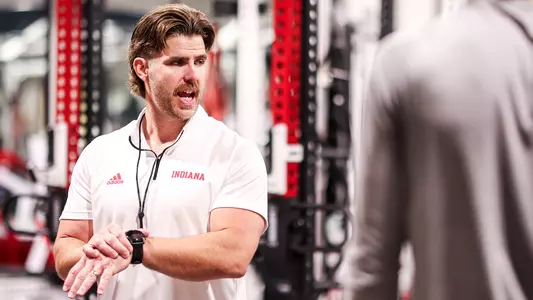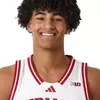Indiana University Athletics

‘Push To Be Great' -- Horn, DeVries Work to Find the Winning Edge
9/9/2025 10:00:00 AM | Men's Basketball
By Pete DiPrimio
IUHoosiers.com
BLOOMINGTON, Ind. – Rap music rocks Simon Skjodt Assembly Hall before a basketball workout session. The Indiana Hoosiers push a relentless conditioning pace designed to steel them for the rigors of the upcoming season and create a difference-making mental and physical edge.
Near midcourt is a sign that emphasizes the priorities:
Stronger.
Faster.
Higher.
Better.
Forward Reed Bailey runs effortlessly during drills, long legs from his 6-foot-10 frame gobbling up yards at a pace only 6-foot-3 guard Tayton Conerway approaches.
The Hoosiers -- some shirtless, others about to be -- run and shuffle on Branch McCracken Court, then push up Assembly Hall stairs, first to the main concourse level, then all the way to the leg-sapping top of the bowl just beneath the balcony.
Ryan Horn, IU's head strength and conditioning coach, directs it all. He's a man on the move with stopwatch in hand -- pacing, gesturing and observing, whistle blowing, words encouraging, approach demanding. He wears a black adidas hat, a Hoosier the Bison "Never Daunted" gray t-shirt and a focused expression.
"It's two reps if we do it right," Horns shouts as players begin an NBA agility drill involving sprinting and shuffling around blue-and-yellow cones.
They do it right and Horn applauds. Next comes running. Players have 22 seconds to twice run baseline to baseline and then end at the free throw line. As they approach the finish, Horn shouts out the seconds -- "17, 18, 19!" They do this multiple times and when they finish -- and they all make the required time -- Horn shouts "Yes!" with fist pump emphasis.
Then they go again.
Conerway, a senior transfer guard from Troy, says the energy Horn brings every day is "crazy."
"You can never tell if he's having a bad day, and it rubs off on us. He wants the best out of everybody. He's going to push you. He's all about getting better. That's what I want to do. Extend my game and get better every day."
Conerway is one of the program's 17 players embracing the demands of Horn, new head coach Darian DeVries and his staff.
We have a great group of kids," Horn says. "They're extremely willing. They want to work. They understand why they came to Indiana. They understand what the expectations are."
Can the Hoosiers turn understanding and expectations into results? Can they add to a tradition-rich program highlighted by five national championships and 22 Big Ten titles. Horn sits in his Cook Hall office just outside the practice court contemplating the challenge of preparing players for a six-month season stretched over two academic semesters while playing to program standards.
Horn sits in his Cook Hall office just outside the practice court contemplating the challenge of preparing players for a six-month season stretched over two academic semesters while playing to program standards.
DeVries' 169-68 record over seven seasons includes a pair of Missouri Valley Conference tourney titles, a regular season MVC championship and three NCAA tourney appearances. Horn has been with DeVries since 2023.
"If you watch us play and practice," Horn says, "we play with great intensity. We're gritty. We're tough. We're unselfish and disciplined. We do that because that's how we win. We play fast; we play hard. That comes at a cost. We have to be prepared to do it."
Preparation taps into Horn's diverse background. He's worked with Danny Manning, first at Tulsa, and then at Wake Forest. He also spent a year as the head strength and conditioning coach at Wichita State after spending time as a strength-and-conditioning specialist for the U.S. Army's 75th Ranger Regiment, an elite special operations force.
Horn tailors that background to fit DeVries' system. That means getting players, including those as tall as 6-foot-11 and weighing as much as 238 pounds, sprinting, jumping, cutting, and covering 25-plus miles a week.
"It's not normal," Horn says. "These guys' body types and sizes have unique challenges and unique advantages. We've got a lot to get done in a short amount of time."
College programs once had years to develop players. Now, with the transfer portal, NIL and NCAA settlement, it's often down to months.
"We get a lot of new faces every summer," Horn says. "How can we make you better in a short amount of time? We're balancing a lot of things now. We have to do more to teach, to integrate our system, to incorporate coaching evaluation."
"There are a lot of moving parts from a basketball standpoint. That's why they're here. They're not here to be weightlifters or bodybuilders. This helps support what they want to do out there as players first."
"The good news is we're working together to get it done. It continues to evolve and change as we go." As the season approaches (IU has an exhibition Oct. 17 against Marian University at Simon Skjodt Assembly Hall and another against Baylor in Indianapolis on Oct. 26 before its Nov. 5 season opener against Alabama A&M), the goal is to neither over nor under prepare. Horn calls dialing the intensity up or down a balancing act to find that sweet spot.
As the season approaches (IU has an exhibition Oct. 17 against Marian University at Simon Skjodt Assembly Hall and another against Baylor in Indianapolis on Oct. 26 before its Nov. 5 season opener against Alabama A&M), the goal is to neither over nor under prepare. Horn calls dialing the intensity up or down a balancing act to find that sweet spot.
Old school methods sometimes meant pushing players until they threw up. Horn doesn't go that far, but he does put players in scenarios of adversity and growth "done in an intelligent and progressive way."
That doesn't mean comfortable.
"Playing hard is a skill," Horn says. "Training hard is a skill. Practicing hard with intent and intensity is a skill."
"Sometimes, that requires you to take players into the deep waters a little bit to see what we have and put us in a place where we can do that. Our guys have an appreciation for that adversity because they draw confidence from that. They get a bond, a connection in having gone through stuff together."
Crunch time -- when 40 minutes and perhaps more of game intensity comes down to winning the last few seconds -- means answering this question -- Can you rise to the challenge?
"We can't go into that moment and wonder if we can do it," Horn says. "We have to give our guys the exposure to it so they can build the skills and confidence to attack it full on and keep moving forward when we get in those situations."
"As a program, the work is the work, and we're doing it with a purpose. Our kids understand the why of what we're doing."
Ultimately, Horn's approach aims to maximize DeVries' style of play, which includes a fast pace, lots of 3-point shooting, and aggressive defense.
"How we train our players might look different than how some other people train because it's tailored to develop the traits needed to thrive in our system," Horn says. "Our program is demand specific not just sport specific."
"We know what we need to do to perform and win. We know what we need to do to practice and play. We look at the positional demands for a particular player. We look at their testing data, their evaluation. We know what they need to be able to do. We meet them where they are now and work to get them to that space down the road. When you look at what a guy needs, the last thing you want to do is take away an elite skill to try to improve a weakness or achieve an arbitrary training goal."
"We tell our guys; we need to create space offensively and occupy space defensively. That requires speed, skill, mobility, fitness, and the ability to engage in physical combat. That's fighting through screens, setting ball screens. We make sure our guys are prepared for that type of contact." Chemistry matters in so many ways, including the connection between head coach and strength coach. In this, Horn and DeVries thrive together.
Chemistry matters in so many ways, including the connection between head coach and strength coach. In this, Horn and DeVries thrive together.
"Coach DeVries is a strength coach's coach," Horn says. "It's how we communicate. Our expectations for the players, our expectations for ourselves align."
Horn and DeVries combined to deliver success at Drake and West Virginia. They aim to do the same thing at IU.
"What I love about Coach Horn," DeVries says, "is he relates well with the guys. He brings great energy and enthusiasm. He's a huge extension of our coaching staff.
"He spends a lot of time with our guys, and our guys respect and trust him. They want to work for him. I think that's what makes him one of the best out there."
Guard Conor Enright continues to benefit from their partnership. He played for both at Drake before transferring to DePaul and then IU.
"He's like Coach DeVries," Enright says of Horn. "He's very detailed. He brings very good vibes. He gets you ready to go. He's one of the best dudes I've been around."
Ask Enright if Horn has changed since their Drake days and he says Horn seems more intense. Otherwise, it's the same.
"He's always there to help you get in extra work, whether it's on a Saturday or after practice or pre-hab," Enright says. "He's all about helping us get to where we need to go. It's awesome that he's so committed."
DeVries and his players thrive from that commitment.
"He knows how to build basketball players," DeVries says. "That's what I really enjoy -- he understands that we want them very functional; we want to train them in a way that allows them to be out on the floor, feeling good, feeling like they can move and function.
"We have a great working relationship so when I need to back off or when he needs to back off, it's because he understands what we just did on the floor the day before. I love the way we're able to work together in that regard."
As Horn puts it, "Meeting the standard is the minimum. Exceeding it is relentlessly encouraged and expected."
Horn points to his office's bare walls.
"It's not about cliches. You don't see a lot of quotes, or anything. But you will see and feel the work. We make sure we have that mindset and environment in how we train and carry ourselves. The discipline in our intent needs to be what it needs to be."
In this, as in so many things, Horn and DeVries are one.
"I've worked with some great coaches," Horn says, "but to have that alignment with the head coach, someone who values it, supports it, appreciates it, to have someone you can lock in with is extremely important. It's an integral part of what we do."
"Coach values our ability to develop players on the court and in the weight room. As a program, we value versatility. You have a multitude of positions and players who have to do a lot of things." Flashback to early August in Cook Hall. A high-energy practice ends in preparation for a Puerto Rico trip that will produce a 3-0 result, including a pair of tough-minded comeback victories over a Serbian pro team that reflect Hoosier potential.
Flashback to early August in Cook Hall. A high-energy practice ends in preparation for a Puerto Rico trip that will produce a 3-0 result, including a pair of tough-minded comeback victories over a Serbian pro team that reflect Hoosier potential.
Players gather to discuss the possibilities and, for some, Horn's impact.
"I think he's the best strength coach in the nation," says Josh Harris, a sophomore transfer forward out of North Florida. "He really pushes us to be great."
Bailey praises Horn's energy.
"He brings it every day," Bailey says. "He makes sure everybody is getting better and working on individual things. He's a great person to be around."
The ultimate goal is to restore IU to its title-winning ways. The Hoosiers haven't won a Big Ten title since 2016, haven't made the Final Four since 2002, haven't won a national championship since 1987.
DeVries was hired to change that. Horn was brought in to aid that.
"We bring guys here for a reason," Horn says. "They do certain things extremely well. We have to let athletes be athletes. How can we get them to do that while bringing up those other things to put them in a place to be successful from a durability, availability, and performance standpoint?"
Elite basketball performance in the 21st Century means fully embracing the latest technology, a practice Horn started a decade ago to maximize opportunity that, for now, involves four hours a week. That will ramp up to 20 hours once practice officially begins by the end of the month. Players wear heartrate monitors, as well as devices that measure how many miles they've run, shots they've taken, and baskets they've made.
In describing that approach, Horn sounds more like a sports scientist than a strength coach.
"We were one of the early and first adopters of athlete tracking in basketball in an indoor sport," he says. "We have a good pulse of what the specific demands are to our program as far as how many miles do we need to travel in a practice, how many sprints do they do, how high do they need to jump, how fast do they need to run, how many times do they accelerate and decelerate based on the position."
He continues …
"What's the distribution of those efforts across the board? What does that recovery window look like?
"We can take that information that has evolved to use it to make more informed decisions as far as how the coaches structure a practice, how they structure the training stress throughout the week to set us up for competition and playing." Rap music shifts to Natasha Bedingfield singing "Unwritten," a song that emphasizes embracing an unknown future with a positive mindset because you get to write your own story.
Rap music shifts to Natasha Bedingfield singing "Unwritten," a song that emphasizes embracing an unknown future with a positive mindset because you get to write your own story.
Horn, in case you're wondering, chooses the music.
"He's got everything," Bailey says with a smile. "Whatever your music taste is, he's got it. We listen to some R&B before practice. Getting into pre-practice, it's usually some rap. Maybe some country here or there. It's fun."
Fun ends. Horn gathers the players for a closing message, pushing the importance of competing and finishing.
"Understand what the stakes are," he says. "Pressure is a privilege."
Horn rates this workout as perhaps the team's best, with more needed.
"Can we do it again and again?"
The season -- and a possible championship -- might depend on it.
IUHoosiers.com
BLOOMINGTON, Ind. – Rap music rocks Simon Skjodt Assembly Hall before a basketball workout session. The Indiana Hoosiers push a relentless conditioning pace designed to steel them for the rigors of the upcoming season and create a difference-making mental and physical edge.
Near midcourt is a sign that emphasizes the priorities:
Stronger.
Faster.
Higher.
Better.
Forward Reed Bailey runs effortlessly during drills, long legs from his 6-foot-10 frame gobbling up yards at a pace only 6-foot-3 guard Tayton Conerway approaches.
The Hoosiers -- some shirtless, others about to be -- run and shuffle on Branch McCracken Court, then push up Assembly Hall stairs, first to the main concourse level, then all the way to the leg-sapping top of the bowl just beneath the balcony.
Ryan Horn, IU's head strength and conditioning coach, directs it all. He's a man on the move with stopwatch in hand -- pacing, gesturing and observing, whistle blowing, words encouraging, approach demanding. He wears a black adidas hat, a Hoosier the Bison "Never Daunted" gray t-shirt and a focused expression.
"It's two reps if we do it right," Horns shouts as players begin an NBA agility drill involving sprinting and shuffling around blue-and-yellow cones.
They do it right and Horn applauds. Next comes running. Players have 22 seconds to twice run baseline to baseline and then end at the free throw line. As they approach the finish, Horn shouts out the seconds -- "17, 18, 19!" They do this multiple times and when they finish -- and they all make the required time -- Horn shouts "Yes!" with fist pump emphasis.
Then they go again.
Conerway, a senior transfer guard from Troy, says the energy Horn brings every day is "crazy."
"You can never tell if he's having a bad day, and it rubs off on us. He wants the best out of everybody. He's going to push you. He's all about getting better. That's what I want to do. Extend my game and get better every day."
Conerway is one of the program's 17 players embracing the demands of Horn, new head coach Darian DeVries and his staff.
We have a great group of kids," Horn says. "They're extremely willing. They want to work. They understand why they came to Indiana. They understand what the expectations are."
Can the Hoosiers turn understanding and expectations into results? Can they add to a tradition-rich program highlighted by five national championships and 22 Big Ten titles.

DeVries' 169-68 record over seven seasons includes a pair of Missouri Valley Conference tourney titles, a regular season MVC championship and three NCAA tourney appearances. Horn has been with DeVries since 2023.
"If you watch us play and practice," Horn says, "we play with great intensity. We're gritty. We're tough. We're unselfish and disciplined. We do that because that's how we win. We play fast; we play hard. That comes at a cost. We have to be prepared to do it."
Preparation taps into Horn's diverse background. He's worked with Danny Manning, first at Tulsa, and then at Wake Forest. He also spent a year as the head strength and conditioning coach at Wichita State after spending time as a strength-and-conditioning specialist for the U.S. Army's 75th Ranger Regiment, an elite special operations force.
Horn tailors that background to fit DeVries' system. That means getting players, including those as tall as 6-foot-11 and weighing as much as 238 pounds, sprinting, jumping, cutting, and covering 25-plus miles a week.
"It's not normal," Horn says. "These guys' body types and sizes have unique challenges and unique advantages. We've got a lot to get done in a short amount of time."
College programs once had years to develop players. Now, with the transfer portal, NIL and NCAA settlement, it's often down to months.
"We get a lot of new faces every summer," Horn says. "How can we make you better in a short amount of time? We're balancing a lot of things now. We have to do more to teach, to integrate our system, to incorporate coaching evaluation."
"There are a lot of moving parts from a basketball standpoint. That's why they're here. They're not here to be weightlifters or bodybuilders. This helps support what they want to do out there as players first."
"The good news is we're working together to get it done. It continues to evolve and change as we go."

Old school methods sometimes meant pushing players until they threw up. Horn doesn't go that far, but he does put players in scenarios of adversity and growth "done in an intelligent and progressive way."
That doesn't mean comfortable.
"Playing hard is a skill," Horn says. "Training hard is a skill. Practicing hard with intent and intensity is a skill."
"Sometimes, that requires you to take players into the deep waters a little bit to see what we have and put us in a place where we can do that. Our guys have an appreciation for that adversity because they draw confidence from that. They get a bond, a connection in having gone through stuff together."
Crunch time -- when 40 minutes and perhaps more of game intensity comes down to winning the last few seconds -- means answering this question -- Can you rise to the challenge?
"We can't go into that moment and wonder if we can do it," Horn says. "We have to give our guys the exposure to it so they can build the skills and confidence to attack it full on and keep moving forward when we get in those situations."
"As a program, the work is the work, and we're doing it with a purpose. Our kids understand the why of what we're doing."
Ultimately, Horn's approach aims to maximize DeVries' style of play, which includes a fast pace, lots of 3-point shooting, and aggressive defense.
"How we train our players might look different than how some other people train because it's tailored to develop the traits needed to thrive in our system," Horn says. "Our program is demand specific not just sport specific."
"We know what we need to do to perform and win. We know what we need to do to practice and play. We look at the positional demands for a particular player. We look at their testing data, their evaluation. We know what they need to be able to do. We meet them where they are now and work to get them to that space down the road. When you look at what a guy needs, the last thing you want to do is take away an elite skill to try to improve a weakness or achieve an arbitrary training goal."
"We tell our guys; we need to create space offensively and occupy space defensively. That requires speed, skill, mobility, fitness, and the ability to engage in physical combat. That's fighting through screens, setting ball screens. We make sure our guys are prepared for that type of contact."

"Coach DeVries is a strength coach's coach," Horn says. "It's how we communicate. Our expectations for the players, our expectations for ourselves align."
Horn and DeVries combined to deliver success at Drake and West Virginia. They aim to do the same thing at IU.
"What I love about Coach Horn," DeVries says, "is he relates well with the guys. He brings great energy and enthusiasm. He's a huge extension of our coaching staff.
"He spends a lot of time with our guys, and our guys respect and trust him. They want to work for him. I think that's what makes him one of the best out there."
Guard Conor Enright continues to benefit from their partnership. He played for both at Drake before transferring to DePaul and then IU.
"He's like Coach DeVries," Enright says of Horn. "He's very detailed. He brings very good vibes. He gets you ready to go. He's one of the best dudes I've been around."
Ask Enright if Horn has changed since their Drake days and he says Horn seems more intense. Otherwise, it's the same.
"He's always there to help you get in extra work, whether it's on a Saturday or after practice or pre-hab," Enright says. "He's all about helping us get to where we need to go. It's awesome that he's so committed."
DeVries and his players thrive from that commitment.
"He knows how to build basketball players," DeVries says. "That's what I really enjoy -- he understands that we want them very functional; we want to train them in a way that allows them to be out on the floor, feeling good, feeling like they can move and function.
"We have a great working relationship so when I need to back off or when he needs to back off, it's because he understands what we just did on the floor the day before. I love the way we're able to work together in that regard."
As Horn puts it, "Meeting the standard is the minimum. Exceeding it is relentlessly encouraged and expected."
Horn points to his office's bare walls.
"It's not about cliches. You don't see a lot of quotes, or anything. But you will see and feel the work. We make sure we have that mindset and environment in how we train and carry ourselves. The discipline in our intent needs to be what it needs to be."
In this, as in so many things, Horn and DeVries are one.
"I've worked with some great coaches," Horn says, "but to have that alignment with the head coach, someone who values it, supports it, appreciates it, to have someone you can lock in with is extremely important. It's an integral part of what we do."
"Coach values our ability to develop players on the court and in the weight room. As a program, we value versatility. You have a multitude of positions and players who have to do a lot of things."

Players gather to discuss the possibilities and, for some, Horn's impact.
"I think he's the best strength coach in the nation," says Josh Harris, a sophomore transfer forward out of North Florida. "He really pushes us to be great."
Bailey praises Horn's energy.
"He brings it every day," Bailey says. "He makes sure everybody is getting better and working on individual things. He's a great person to be around."
The ultimate goal is to restore IU to its title-winning ways. The Hoosiers haven't won a Big Ten title since 2016, haven't made the Final Four since 2002, haven't won a national championship since 1987.
DeVries was hired to change that. Horn was brought in to aid that.
"We bring guys here for a reason," Horn says. "They do certain things extremely well. We have to let athletes be athletes. How can we get them to do that while bringing up those other things to put them in a place to be successful from a durability, availability, and performance standpoint?"
Elite basketball performance in the 21st Century means fully embracing the latest technology, a practice Horn started a decade ago to maximize opportunity that, for now, involves four hours a week. That will ramp up to 20 hours once practice officially begins by the end of the month. Players wear heartrate monitors, as well as devices that measure how many miles they've run, shots they've taken, and baskets they've made.
In describing that approach, Horn sounds more like a sports scientist than a strength coach.
"We were one of the early and first adopters of athlete tracking in basketball in an indoor sport," he says. "We have a good pulse of what the specific demands are to our program as far as how many miles do we need to travel in a practice, how many sprints do they do, how high do they need to jump, how fast do they need to run, how many times do they accelerate and decelerate based on the position."
He continues …
"What's the distribution of those efforts across the board? What does that recovery window look like?
"We can take that information that has evolved to use it to make more informed decisions as far as how the coaches structure a practice, how they structure the training stress throughout the week to set us up for competition and playing."

Horn, in case you're wondering, chooses the music.
"He's got everything," Bailey says with a smile. "Whatever your music taste is, he's got it. We listen to some R&B before practice. Getting into pre-practice, it's usually some rap. Maybe some country here or there. It's fun."
Fun ends. Horn gathers the players for a closing message, pushing the importance of competing and finishing.
"Understand what the stakes are," he says. "Pressure is a privilege."
Horn rates this workout as perhaps the team's best, with more needed.
"Can we do it again and again?"
The season -- and a possible championship -- might depend on it.
Players Mentioned
IUBB Pregame Press Conference
Friday, October 24
FB: Under the Hood with Indiana Football - Week 9 (UCLA)
Wednesday, October 22
FB: Carter Smith Media Availability (10/21/25)
Tuesday, October 21
FB: Stephen Daley Media Availability (10/21/25)
Tuesday, October 21




